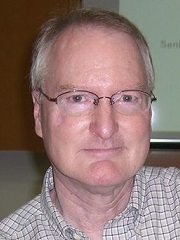John Cologne
Affiliation
Department of Statistics
E-mail: cologne@rerf.or.jp
E-mail: cologne@rerf.or.jp
About
Dr. Cologne is a consulting biostatistician trained in environmental risk assessment and clinical biostatistics whose primary interest is in applying, adapting, extending, or developing statistical methodology for epidemiological and clinical studies of disease risk. In addition to traditional biostatistics methods (observational study design, analysis of cohort follow-up and case-control data, event-time and longitudinal data analysis, and general regression modeling), he has applied high-dimensional genomic data methods to study gene sets and pathways with SNP data and has implemented causal models to study risk factor effects on observed or latent clinical outcomes with potential mediation. Dr. Cologne has also led the effort in the Department of Statistics to ensure that work conforms to current standards of reproducible research through use of RStudio and Stata dynamic document facilities.
Education
- 2018
- ELS, Board of Editors in the Life Sciences
- 1989
- PhD, Biostatistics, University of Washington
- 1988
- MS, Biostatistics, University of Washington
- 1984
- MS, Statistics, Dept. of Mathematics, University of California, San Diego
- 1976
- BA, Biology, UCLA
Experience
- Radiation Effects Research Foundation, Department of Statistics
-
- 2009-
Senior Scientist
- 2007-2009
Consultant
- 2006-2007
Senior Scientist
- 2005-2006
Acting Department Chief
- 2003-2005
Assistant Department Chief
- 1998-2003
Senior Scientist
- 1994-1998
Associate Senior Scientist
- 1989-1994
Research Scientist
- 2009-
- School of Public Health, University of Washington, Seattle, WA
-
- 1984-1989
Research/Teaching Assistant, Department of Biostatistics
- 1984-1989
- NOAA, Southwest Fisheries Center, La Jolla, California
-
- 1983-1984
Biostatistician, Marine Mammal Population Survey Studies
- 1983-1984
- University of California, San Diego, School of Medicine, Department of Surgery
-
- 1977-1983
Laboratory Research Associate
- 1977-1983
Selected publications
- Nakamizo T, Cologne J, Kishi T, et al. Reliability, stability during long-term storage, and intra-individual variation of circulating levels of osteopontin, osteoprotegerin, vascular endothelial growth factor-A, and interleukin-17A. European Journal of Medical Research. 2024; DOI: 10.1186/s40001-024-01722-w.
- Nakamizo T, Cologne J, Cordova K, et al. Radiation effects on atherosclerosis in atomic bomb survivors: a cross-sectional study using structural equation modeling. European Journal of Epidemiology. 2021; DOI: 10.1007/s10654-021-00731-x.
- Kim YM, Cologne JB, Jang E, et al. Causal mediation analysis in nested case-control studies using conditional logistic regression. Biometrical Journal. 2020; 1-21.
- Cologne J, Kim J, Sugiyama H, et al. Effect of heterogeneity in background incidence on inference about the solid-cancer radiation dose response in atomic-bomb survivors. Radiation Research. 2019; 192(4):388-398.
- Cologne J, Takahashi I, French B, et al. Association of weight fluctuation with mortality in Japanese adults. JAMA Network Open. 2019; 2(3):e190731.
- Cologne J, Furukawa K, Grant EJ, Abbott RD. Effects of omitting non-confounding predictors from general relative-risk models for binary outcomes. Journal of Epidemiology. 2019; 29(3):116-122.
- Barlow WE, Cologne JB. Alternative formulation of models in case-control studies. Chapter 11 in: Borgan Ø, Breslow NE, Chatterjee N, Gail MH, Scott A, Wild CJ, eds. Handbook of Statistical Methods for Case-Control Studies. Boca Raton: FL: CRC Press; 2018.
- Cologne J, Loo L, Shvetsov Y, et al. Stepwise approach to SNP-set analysis illustrated with the Metabochip and colorectal cancer in Japanese Americans of the Multiethnic Cohort. BMC Genomics 2018; 19:524.
- Cologne J, Preston DL, Grant EJ, Cullings HM, Ozasa K. Effect of follow-up period on minimal-significant dose in the atomic-bomb survivor studies. Radiation and Environmental Biophysics. 2018; 57(1):83-88.
- Cologne J, Preston DL, Imai K, et al. Conventional methods of case-cohort study design and analysis for studies of interaction. International Journal of Epidemiology. 2012; 41:1174-1186.
- Cologne J, Hsu W-L, Abbott RD, et al. Proportional hazards regression in epidemiologic follow-up studies: an intuitive consideration of primary time scale. Epidemiology. 2012; 23:565-573.


